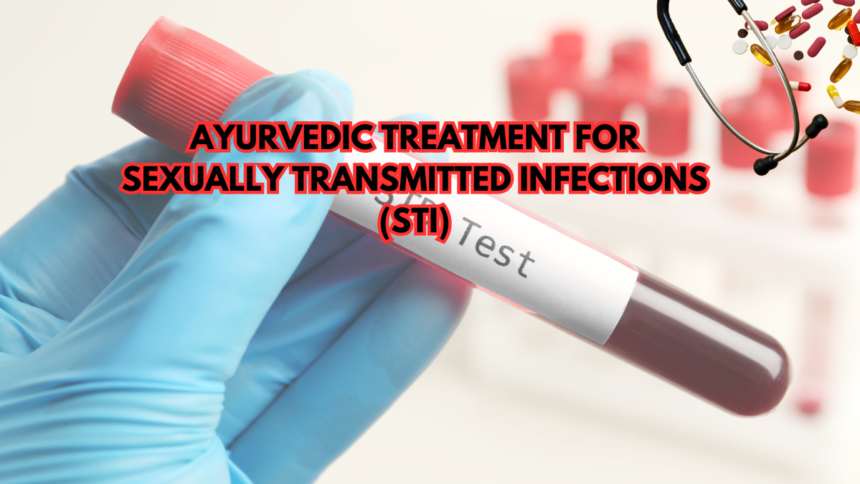Ayurvedic Treatment for Sexually Transmitted Infections (STIs)
1. Chlamydia
Ayurvedic Approach:
Chlamydia can be linked to an imbalance in the Pitta dosha, leading to inflammation and infection.
- Herbs:
- Neem (Azadirachta indica): Antibacterial properties help fight infection.
- Manjistha (Rubia cordifolia): Purifies blood and reduces inflammation.
- Turmeric (Curcuma longa): Antimicrobial and anti-inflammatory.
- Therapies:
- Snehapana (Oil Therapy): Medicated ghee to remove toxins.
- Panchakarma Detox: Specifically Virechana (purgation) to balance Pitta.
2. Syphilis
Ayurvedic Approach:
Syphilis can be linked to severe imbalances in Vata, Pitta, and Rakta Dhatu (blood tissues).
- Herbs:
- Guduchi (Tinospora cordifolia): Boosts immunity and reduces fever.
- Chirayata (Swertia chirata): Blood purifier with antimicrobial properties.
- Khadir (Acacia catechu): Removes toxins from the blood.
- Therapies:
- Raktamokshana (Bloodletting Therapy): Purifies blood and reduces symptoms.
- Basti (Enema Therapy): Strengthens immunity and removes toxins.
3. Gonorrhoea
Ayurvedic Approach:
Gonorrhoea is often associated with Pitta and Kapha dosha imbalances, leading to excessive discharge and inflammation.
- Herbs:
- Triphala: Natural detoxifier for the urinary system.
- Chandana (Sandalwood): Soothes inflammation in the urinary tract.
- Punarnava (Boerhavia diffusa): Reduces swelling and infection.
- Therapies:
- Urovasthi: Application of medicated oil on the pelvic region to reduce pain.
- Kashayam (Herbal Decoctions): Flushes out toxins and infections.
Video Credits
4. Genital Warts
Ayurvedic Approach:
Genital warts are associated with Kapha dosha imbalance and can be treated by boosting immunity and removing toxins.
- Herbs:
- Bakuchi (Psoralea corylifolia): Promotes skin healing and reduces warts.
- Haridra (Turmeric): Prevents viral growth and soothes skin.
- Khadira (Acacia catechu): Removes skin toxins.
- Therapies:
- Lepam (Herbal Paste): Local application of turmeric or neem paste on warts.
- Agnikarma (Cauterization): Effective for wart removal.
5. Herpes
Ayurvedic Approach:
Herpes is linked to an aggravated Pitta and Kapha dosha, leading to skin eruptions, itching, and burning.
- Herbs:
- Guduchi: Reduces fever and strengthens immunity.
- Aloe Vera (Kumari): Soothes skin irritation.
- Ashwagandha (Withania somnifera): Reduces stress and boosts immunity.
- Therapies:
- Panchakarma Detox: Balances doshas and clears toxins.
- Pranayam and Meditation: Reduces stress that triggers outbreaks.
General Ayurvedic Lifestyle Recommendations for STIs
- Diet:
- Avoid spicy, fried, and processed foods that aggravate Pitta.
- Include cooling and detoxifying foods like coconut water, amla, and green leafy vegetables.
- Hygiene:
- Maintain proper genital hygiene to prevent secondary infections.
- Use herbal washes like neem or triphala-infused water.
- Yoga and Pranayama:
- Gentle yoga postures to improve circulation and reduce stress.
- Breathing exercises like Anulom Vilom and Bhramari for immunity.
- Hydration:
- Drink plenty of water and herbal teas to flush toxins from the system.
Benefits of Ayurvedic Treatment
- Addresses the root cause of infection rather than just symptoms.
- Strengthens the immune system to prevent recurrence.
- Restores balance in the body and mind for overall well-being.
Note
While Ayurveda can effectively manage and support STI recovery, it is essential to combine Ayurvedic treatments with modern medicine in severe cases. Early diagnosis and consultation with an Ayurvedic practitioner are recommended for a personalized treatment plan.Ayurveda offers holistic approaches to managing these infections by focusing on detoxification, balancing doshas, strengthening the immune system, and providing symptomatic relief.











